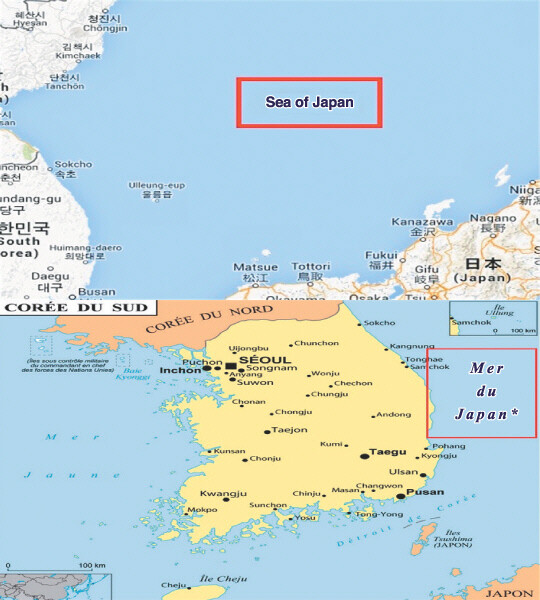hankyoreh
Links to other country sites 다른 나라 사이트 링크
Study: foreign embassies in Seoul use “Liancourt” instead of “Dokdo”

By Kim Il-woo, Daegu correspondent and Park Byong-su, senior staff writer
Many foreign embassies in Seoul have maps on their websites showing the Dokdo islets as the “Liancourt Rocks” and the East Sea as the “Sea of Japan,” a study finds.
The Daegu and North Gyeongsang Province chapters of the Justice Party held a press conference at their Daegu office on the morning of Feb. 11 to announce the findings.
“We examined 17 websites for foreign embassies with maps and found that all but one of them listed Dokdo and the East Sea in a way that is favorable to Japan,” they announced. They went on to urge Seoul to take action on the matter.
The websites of the Russian and Indonesian embassies in Seoul both list Dokdo as the Liancourt Rocks and the East Sea as the Sea of Japan. A total of 11 countries were found to have used the same format on their websites.
The map of South Korea on the French embassy’s website does not give any name for Dokdo, but lists the East Sea as the Sea of Japan. The map on the Thai embassy’s website does not mark either Dokdo or the East Sea.
But the maps on the websites of the countries’ Japanese embassies were found to use the terms “Sea of Japan,” “Liancourt Rocks,” and “Takeshima,” which have been advocated by Japan. The name “Liancourt Rocks” is a “neutral” term that Japan has suggested the international community use in place of “Dokdo.” “Liancourt” is the name of the Western ship that first sighted the islets in 1849.
Of the countries examined, only the Israeli embassy honored its host country’s request to use the names “Dokdo” and “East Sea” on its website. Israel uses the two names on the website for its embassy in South Korea, but “Liancourt Rocks” and “Sea of Japan” for its Japanese embassy website.
The Daegu and North Gyeongsang Justice Party chapters used a portal search to examine the web pages of around 30 foreign embassies in South Korea over the past month. Their analysis focused on the web pages of 17 foreign embassies in Seoul and Tokyo that included maps.
“The reason foreign ambassadors are in South Korea is to look at the sentiments of people in the host country and build friendly relations,” said Park Chang-ho, chairman of the North Gyeongsang chapter.
“It is not right for foreign embassies in South Korea to use maps that accept the Japanese claims, and the government needs to take stern action to resolve this,” Park said.
A source with the Ministry of Foreign Affairs said an examination of the website suggested the problem stemmed from many of the countries using Google Maps.
“We’re working through our general consulate in San Francisco, which is close to Google headquarters, in an effort to get Google to use the accurate names,” the source said on condition of anonymity.
Please direct questions or comments to [english@hani.co.kr]

Editorial・opinion
![[Column] Has Korea, too, crossed the Rubicon on China? [Column] Has Korea, too, crossed the Rubicon on China?](https://flexible.img.hani.co.kr/flexible/normal/500/300/imgdb/original/2024/0419/9317135153409185.jpg) [Column] Has Korea, too, crossed the Rubicon on China?
[Column] Has Korea, too, crossed the Rubicon on China?![[Correspondent’s column] In Japan’s alliance with US, echoes of its past alliances with UK [Correspondent’s column] In Japan’s alliance with US, echoes of its past alliances with UK](https://flexible.img.hani.co.kr/flexible/normal/500/300/imgdb/original/2024/0419/2317135166563519.jpg) [Correspondent’s column] In Japan’s alliance with US, echoes of its past alliances with UK
[Correspondent’s column] In Japan’s alliance with US, echoes of its past alliances with UK- [Editorial] Does Yoon think the Korean public is wrong?
- [Editorial] As it bolsters its alliance with US, Japan must be accountable for past
- [Guest essay] Amending the Constitution is Yoon’s key to leaving office in public’s good graces
- [Editorial] 10 years on, lessons of Sewol tragedy must never be forgotten
- [Column] A death blow to Korea’s prosecutor politics
- [Correspondent’s column] The US and the end of Japanese pacifism
- [Guest essay] How Korea turned its trainee doctors into monsters
- [Guest essay] As someone who helped forge Seoul-Moscow ties, their status today troubles me
Most viewed articles
- 1[Column] The clock is ticking for Korea’s first lady
- 2Samsung barricades office as unionized workers strike for better conditions
- 3After 2 months of delayed, denied medical care, Koreans worry worst may be yet to come
- 4[Correspondent’s column] In Japan’s alliance with US, echoes of its past alliances with UK
- 5[Column] Has Korea, too, crossed the Rubicon on China?
- 6Hong Se-hwa, voice for tolerance whose memoir of exile touched a chord, dies at 76
- 7All eyes on Xiaomi after it pulls off EV that Apple couldn’t
- 8US overtakes China as Korea’s top export market, prompting trade sanction jitters
- 9[Photo] Smile ambassador, you’re on camera
- 10[Guest essay] How Korea turned its trainee doctors into monsters